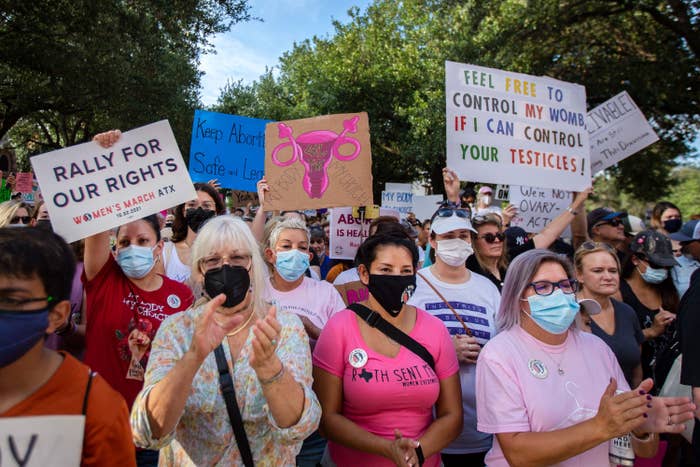
Texas's six-week abortion ban is at least temporarily back in effect as of Friday night after a federal appeals court paused a lower court order from earlier this week that had halted enforcement of the law.
The order from a three-judge panel of the US Court of Appeals for the 5th Circuit, granting what’s known as an “administrative stay,” isn’t permanent — the court will now decide whether to grant Texas’s request for a longer-term hold that would keep the law, SB 8, in effect while the state appeals its loss in the district court. The circuit ordered the Justice Department to respond by Tuesday at 5 p.m. CT.
In the meantime, however, the law will go back into effect, just two days after the preliminary injunction from US District Judge Robert Pitman allowed at least some healthcare providers in Texas to resume performing abortions for pregnant people past the sixth week of pregnancy.
The appeals court’s move came after Pitman on Oct. 6 temporarily blocked enforcement of Texas’s law, which, with a legally novel design, bans nearly all abortions after fetal cardiac activity is detected, typically around the sixth week of pregnancy. In his ruling, Pitman concluded that the law was "flagrantly unconstitutional."
“From the moment S.B. 8 went into effect, women have been unlawfully prevented from exercising control over their lives in ways that are protected by the Constitution,” he wrote in a 113-page ruling.
The legal fight over SB 8 will continue, as the 5th Circuit will now decide if Pitman's order can stand. The Justice Department, which brought the constitutional challenge against Texas, could ask the full appeals court to reconsider the three-judge panel's decision to grant the stay and could eventually petition the US Supreme Court to step in.
Earlier on Friday, Texas had asked the 5th Circuit to step in “as soon as possible” to allow the ban to resume as the litigation continues.
The three-judge panel that granted the administrative stay included Judge James Ho, one of former president Donald Trump's nominees to the court and one of the most vocally anti-abortion judges in the country. In a 2018 case, he described abortion as a "moral tragedy." The panel also included Judge Catharina Haynes, confirmed under former president George W. Bush, and Judge Carl Stewart, confirmed under former president Bill Clinton. The 5th Circuit has a deeply conservative majority that in the past has sided with Republican-led states seeking to enact anti-abortion laws. Over the summer, the court upheld a Texas law that prohibited a method of abortion typically used in the second trimester of pregnancy; Ho and Haynes joined the majority opinion, and Stewart was among the judges who dissented.
A Justice Department spokesperson did not immediately comment on the order. Abortion rights advocates were swift to denounce it, saying that it once again created uncertainty about access to the procedure.
"Patients are being thrown back into a state of chaos and fear, and this cruel law is falling hardest on those who already face discriminatory obstacles in health care, especially Black Indigenous, and other people of color, undocumented immigrants, young people, those struggling to make ends meet, and those in rural areas. The courts have an obligation to block laws that violate fundamental rights," Nancy Northup, president and CEO of the Center for Reproductive Rights, said in a statement. The center is representing Texas abortion providers in a separate lawsuit challenging SB 8.
SB 8 went into effect Sept. 1 after the US Supreme Court chose not to stop it while a constitutional challenge continued. The law is unique in that it gives enforcement authority to private individuals rather than the state. The law allows citizens to sue healthcare providers or anyone who “aids or abets” an abortion that is suspected of falling under the ban, and it incentivizes such suits with few limits on who can actually bring a case.


